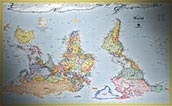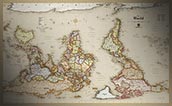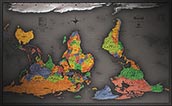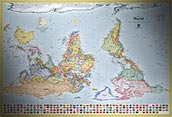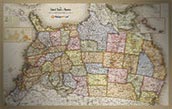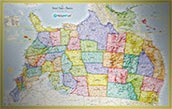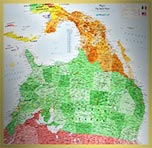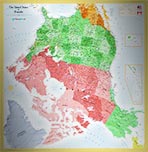Upside Down Maps
Upside-down maps, or reversed maps, show the geography with south oriented at the top, rather than north.
An upside down map is not only a fun and interesting way to look at the world...it's also a valuable teaching tool that helps us understand our preconceptions, promotes open-minded thinking, and inspires curiosity about world geography in a way no other map can.
Read more below about the benefits offered by an upside-down map.
Upside Down Map Purchasing Options
Psychology of Seeing the World Upside Down
Perhaps few images are as familiar to us as the world map. We've all likely seen the world map thousands of times since our earliest days of memory. Having that image ingrained in our minds leaves little wonder why seeing it turned completely upside down (literally) can be startling.
Typically, seeing the map upside-down for the first time causes a reaction of curiosity, and questions begin to arise about world geography that had never really been considered before:

"Is it 'correct' to show a map south-up?"
"Why is the world always shown north-up?"
"Why is the round Earth shown flat on a map in the first place?"
"Are there other ways to view the world?"
. . . and probably most importantly:
"Why have I never thought about these questions before and simply taken it for granted that the standard north-up view of the world is the ONLY view?"
This final question is a powerful question: "why have I never questioned this before?". It's the basic psychological reaction to the shattering of a preconception, in this case that north is on top and south is on the bottom.
Exposing a preconception helps us to seek out other preconceptions that we might have. Thus, the primary value of an upside-down map is that it promotes open-minded thinking, the questioning of common wisdom, and help us to "think outside the box".
This is the perfect frame of mind for anyone in business, education, research and development or any other activity that involves finding solutions to complicated problems.
Geographic Perspective of an Upside Down World Map
Which is correct: North-Up or South-Up?
Geographically speaking, there is no objective reason that it is correct or incorrect to show either north or south oriented at the top of a map (or east or west, for that matter).
The Earth is a round ball of mass flying around the sun in space, which in turn is flying around other mass in space, (and so on)
There is no "up".
Even when only looking at the Earth and not considering the outside universe, there is no reason that either the northern or southern axis point (the north and south poles) should be considered the "top" or "bottom".
Both ways to display the map are equally correct.
How does the Geography Change on an Upside Down Map?
It doesn't.
It's hard to imagine, being that the south-up it looks so strange, but the geography of the upside-down world map is exactly the same as the standard view...aside from the obvious change.

However, there are many aspects of world or regional geography that become more noticeable when the map is displayed with reverse orientation. . .not because of being upside down, but because of being different.
Though you may have a different experience, here some world geography features that we feel are more pronounced in an upside down map:
- Russia is huge. (Maybe we just got used to it being so big in the standard map)
- Oceans are huge.
- Europe is tiny, especially the individual countries within Europe.
- South America is much further east than commonly thought.
- A vast majority of land is north of the equator (67%).
Whatever aspects of geography stand out to you in an upside down map, it is nearly guaranteed that you will be seeing the world from an entirely different point of view.
Having Fun with Upside Down Maps

The light-hearted side of upside down maps (aside from startling people) is that the southern of two neighboring bodies can now be viewed as the one that's "on-top".
For example, in an upside-down map, Mexico now sits directly "on top" of the USA and the United States gets a chance to sit "above" Canada. This is obviously a humorous and refreshing change for those south of the border to no longer be "on the bottom".

